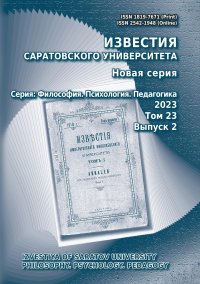Izvestiya of Saratov University. Philosophy. Psychology. Pedagogy. 2023, Vol. 23, iss. 2
Content
Philosophy
Baturina I. V.
The mythology of technologies in Russian legal discourse: Analytics of normative regulation in the field of artificial intelligence
124
Biryukov A. A.
Comprehension of the historical process in the theological heritage of Origen of Alexandria
129
Duplinskya Y. M.
Mathematics and physical reality: The theme of the absence of the “Transcendental Signifi ed” in the language of modern fundamental science
139
Markhinin V. V.
Science and power in the political philosophy of F. Bacon: From reformism towards social criticism
144
Romashchenko A. A.
The practice of perceiving space and time from an existential-phenomenological perspective
149
Sedankina T. E.
Coincidentia oppositorum as a particular way of thinking and life of a theologian
154
Semenova E. S.
Two preachings on Lazarus Saturday: The moral dimension of friendship according to Saint Justin (Polyansky) and Saint Innocent of Kherson
159
Solomko D. V.
The role of technical in the preservation and reproduction of the living principle in a human
164
Chikaeva T. A.
The value and semantic meaning of the Motherland in A. S. Panarin’s book “Orthodox civilization in the global world”: A philosophical analysis
180
Psychology
Gerasimova T. V.
Psychological and pedagogical approaches to the formation of a complex of professionally important personality traits of future doctors
185
Ryaguzova E. V., Chernyaeva T. I.
Semantic codes of the modern profession “Teacher”: Invariants and innovations
203
Titova O. I.
Attitudes toward social interaction with masculine and feminine types: An empirical study
211
Pedagogy
Anpilogova T. Y.
Factors in the development of historical and local history activities of Soviet students in the second half of the 1950s – mid-1980s
216
Voronina D. K.
Assessment of students’ foreign language profession-oriented communicative competence
221
Voropaev M. V., Rezakov R. G., Derevyankina O. M.
Operational aspects of forming educational activity culture of future teachers in the poliparadigm educational space
226

